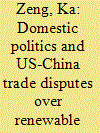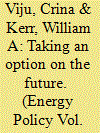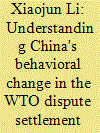| Srl | Item |
| 1 |
ID:
142077


|
|
|
|
|
| Summary/Abstract |
In this article I draw on the two-level game approach to analyze the influence of domestic politics on US-China trade disputes in alternative energy, especially in solar energy. I suggest that the difficulty Washington faces in getting China to address market access barriers in alternative energy needs to be viewed in light of both the coalitional dynamics in the United States resulting from the specific bilateral trade and investment relationship in this sector and Beijing's willingness to use industrial policy to foster economic competitiveness in nascent industries. Specifically, as China occupies the middle of the supply chain in the solar industry, both downstream users of low-cost Chinese imports and exporters of upstream products to China have voiced strong concerns about US trade action. Such domestic opposition, coupled with the importance of industrial policy for defending the country's long-term interests in a “strategic emerging” sector such as alternative energy, substantially constrains Washington's ability to influence Chinese policies.
|
|
|
|
|
|
|
|
|
|
|
|
|
|
|
|
| 2 |
ID:
126967


|
|
|
|
|
| Publication |
2013.
|
| Summary/Abstract |
Although China's use of the WTO dispute settlement system has increased, its legal actions remain less aggressive than those of other large economies. This article examines how China's subsidy policies make Chinese leaders reluctant to use WTO dispute settlement mechanisms in resolving trade disputes with other countries.
|
|
|
|
|
|
|
|
|
|
|
|
|
|
|
|
| 3 |
ID:
121310


|
|
|
|
|
| Publication |
2013.
|
| Summary/Abstract |
This paper examines the biofuels industry from a policy and international trade perspective. Across the globe there are two main public policy objectives driving the development of biofuels industries-improving energy security and reducing global warming. The US and Canadian governments have respectively fostered biofuels industries for these reasons. As biofuels industries will not be financially viable without government support in the foreseeable future, government policies can be interpreted as taking options on the future. A theoretical model is developed using option value theory to determine whether the same governmental policy (subsidization) can lead to different levels of optimal subsidies in each country, where the subsidy policy is driven by two distinct motivating factors. If the reason subsidy levels differ is structural, the likelihood of a trade dispute arising increases.
|
|
|
|
|
|
|
|
|
|
|
|
|
|
|
|
| 4 |
ID:
117657


|
|
|
|
|
| Publication |
2012.
|
| Summary/Abstract |
This article reviews China's change from cautious observer to active participant in the World Trade Organization's (WTO) dispute settlement system over the past decade. It argues that normative, rather than material, constraints deterred China from WTO litigation in the initial years of its membership.
|
|
|
|
|
|
|
|
|
|
|
|
|
|
|
|
| 5 |
ID:
072280


|
|
|
|
|
| Publication |
2006.
|
| Summary/Abstract |
Developing countries face considerable disadvantages in trade disputes with their more powerful and wealthier counterparts. Nonetheless, Benin, Burkina Faso and Mali successfully challenged US cotton subsidies, a watershed event in international trade relations. This article explores how the West African governments and cotton farmers confronted US policy, why they succeeded, and the campaign's likely implications. Drawing on interviews with representatives in West Africa and Geneva, public statements, documents filed with the World Trade Organisation (WTO), media coverage, and materials from non-governmental organisations, I analyse the behaviour of four key actors behind this initiative: cotton farmers, producers' unions, governments and the international financial institutions. Tactics included using the WTO's trade-dispute mechanisms, deploying many spokespeople with common messages, enlisting powerful allies, and using the media. The West African campaign is an example of politically weak countries effectively exploiting the liberal economic principles of multilateral institutions to challenge protectionist policies in the industrialised world.
|
|
|
|
|
|
|
|
|
|
|
|
|
|
|
|